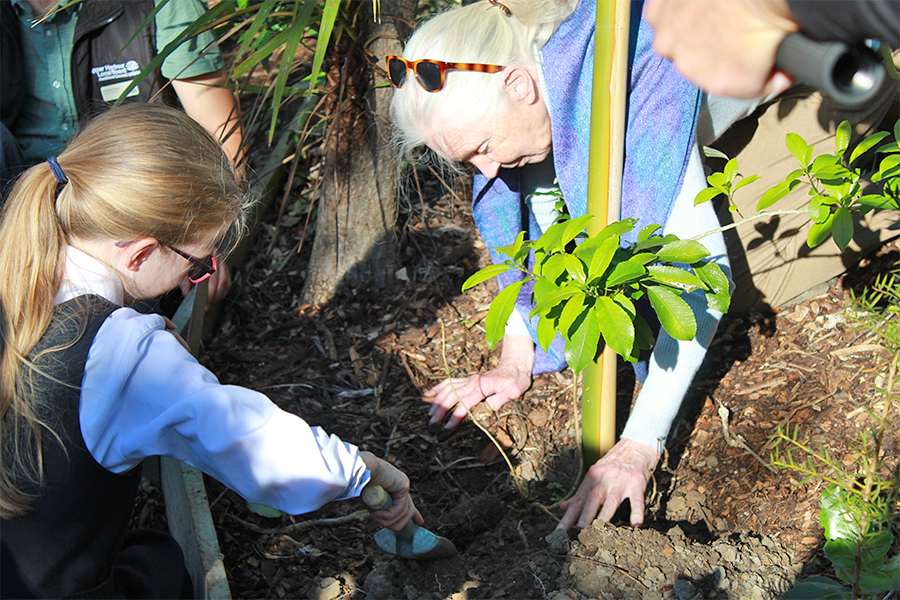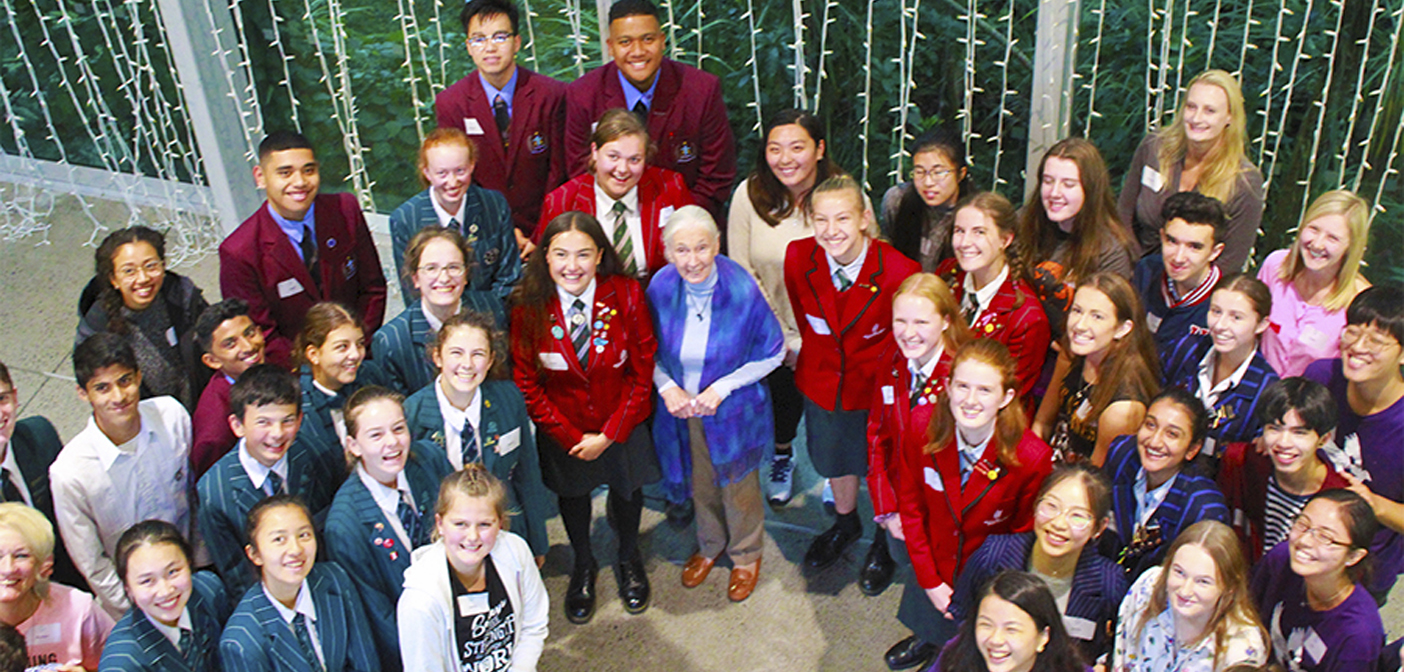YOUTH REPORTER - ROOTS & SHOOTS - FOUNDATIONS FOR OUR FUTURE
The Jane Goodall Institute New Zealand provided the opportunity for three high school students from across New Zealand to attend Dr Jane Goodall’s events during her recent 'Rewind The Future' tour and interview Dr Jane and provide their youth reporter perspectives.
Our second article is by 15-year-old Auckland student Taleah Rochelle.
BY TALEAH ROCHELLE ON JUNE 20, 2019
Dr. Jane Goodall arrived in Auckland as part of her world tour advocating for the preservation and wellbeing of our animals, people and the environment.
During Dr. Goodall’s visit to Auckland she spoke at the ASB Theatre, Aotea Centre and visited Kristin School on Auckland’s North Shore where she met with a range of students to promote her Roots & Shoots programme. The aim of the programme is to encourage compassionate leadership, as well as an understanding of different beliefs and cultures, inspiring people of all ages and walks of life to take action, and to help make the world a better place for all who inhabit it.

After being welcomed into the school by a Waiata performed by the primary students, Jane was led on a nature trail by eager year 5 students from the school’s enviro group, where they unveiled a series of beautifully carved wooden boards displaying some of Jane’s quotes. The trail also hosts art projects made by students and the community to raise awareness about the problems the world faces regarding the declining numbers of our beautiful animals and plants and the current climate crisis.
Kristin School have a range of projects educating their students on native plants and animals, waste management, and their individual impact on the environment. Some of these projects include an endangered species project raising awareness about animals through competitions and posters, as well as planting native trees and cleaning up gardens. Kristin school students told me, “By using the principle of being introspective, we have been able to create goals and understand more clearly what it is to be sustainable.”

Following the trail walk, Jane joined 40 students at the Compassionate Leadership Conference on the school grounds. Here the students shared with Jane their visions and projects for creating a better future.
Students from De La Salle College undertook a project to regrow the native bushland and clean a nearby creek in conjunction with members of their local community. Toma, a student at De La Salle College explained, “Alone we can do so little, together we can do so much.”
The Academy of Gifted Education (AGE) group worked together alongside teachers and their community to clean their shorelines and undertake a program of planting. A second programme lead by the student group is the collection and repurposing of soft plastics, using them as insulation in an onsite shelter. One Year 7 student from AGE told me, “At the end of the day if we are truly going to be eco warriors, we must step into our power, encourage, and lead by example one step at a time.”

Interview below:
T: How can young people get involved in your work?
J: You can join our youth programme which is Roots & Shoots, and you can find out about it from our of the JGI NZ people more about that.
T: What were the first things you did to change your impact on the environment?
J: Well, I don’t know. I mean, I suppose for years and years I lived in the most simple way you can imagine, with basically one meal a day from a nearby village and wearing the same clothes day after day after day, so I was making almost no impact on the environment.
T: How did you cut down on waste?
J: I grew up in the war, and so in the war everything was rationed. We learned not to take anything for granted, whether it was food or clothes or life even. And so I detest waste, so to cut down you don’t buy more than you want, don’t take more food than you want.
T: Who inspires you?
J: Well, my mother inspired me when I was growing up; and you know as I’m travelling around I meet all sorts of people who who inspire me, people who have lived really difficult lives and they’ve managed to come out smiling — all sorts of people.
T: Which of your accomplishments makes you feel most proud?
J: Two of them. One, starting Roots & Shoots, because that’s now in 60 countries and all ages. And, the other one is helping science to stop thinking that we humans were quite apart from all the other animals, because the chimps are so like us. Scientists simply had to believe that we’re not the only beings with personality, minds and feelings and now that’s applied to all animals.
T: What’s your advice to young people now who want to evolve more and understand the issues we’re facing?
J: The most important thing is to remember that every single day you live, you make some impact in the world and you get to choose what sort of impact. So think about what you buy, where did it come from? How was it made? Did it harm the environment? Does it lead to cruelty to animals like the intensive animals from factory farms? Is it cheap because of child slave labour? And really try and make ethical choices in how you live. And then if you join Roots & Shoots you’ll be linked up to other people who also want to make change and that will make you feel strong.
T: What are your hopes for the future generations?
J: That we’ll have a critical mass of young people who understand we need money to live and that it goes wrong when we live for money, and young people who have a connection with the natural world and don’t spend all their time on cellphones and smartphones, tablets and video games. We need to understand nature.
___
“Roots creep underground everywhere and make a firm foundation. Shoots seem very weak, but to reach the light, they can break open brick walls. Imagine that the brick walls are all the problems we have inflicted on our planet. Hundreds of thousands of roots and shoots, hundreds of thousands of young people around the world, can break through these walls.” – Dr. Jane Goodall
